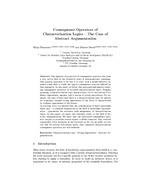Consequence Operators for Characterization Logics – The Case of Abstract Argumentation
From International Center for Computational Logic
Consequence Operators for Characterization Logics – The Case of Abstract Argumentation
Ringo BaumannRingo Baumann, Hannes StraßHannes Straß
Ringo Baumann, Hannes Straß
Consequence Operators for Characterization Logics – The Case of Abstract Argumentation
In Gopal Gupta and Carmine Dodaro and Maria Vanina Martínez, eds., Proceedings of the Seventeenth International Conference on Logic Programming and Non-monotonic Reasoning (LPNMR), LNCS, to appear. Springer
Consequence Operators for Characterization Logics – The Case of Abstract Argumentation
In Gopal Gupta and Carmine Dodaro and Maria Vanina Martínez, eds., Proceedings of the Seventeenth International Conference on Logic Programming and Non-monotonic Reasoning (LPNMR), LNCS, to appear. Springer
- KurzfassungAbstract
The analysis of properties of consequence operators has been a very active field in the formative years of non-monotonic reasoning. One possible approach to do this is to start with a model-theoretic semantics and then to study the logical consequence relation induced by that semantics.In this paper we follow that approach and analyse resulting consequence operators of so-called characterization logics. Roughly speaking, a characterization logic characterizes, via its own notion of ordinary equivalence, another logic's notion of strong equivalence. For example, the logic of here and there is a characterization logic for answer set programs, because strong equivalence of the latter is characterized by ordinary equivalence of the former.
In previous work, we showed that the consideration of finite knowledge bases only – a common assumption in the field of knowledge representation -- guarantees the existence (and uniqueness) of characterization logics. In this paper, we apply this existence result to the field of abstract argumentation. We show that the associated consequence operator outputs a so-called reverse kernel, a useful construct that received comparably little attention in the literature so far. As an aside, we clarify that for several well-known logics, their canonical characterization consequence operators are well-behaved. - Forschungsgruppe:Research Group: Computational LogicComputational Logic
@inproceedings{BS2024,
author = {Ringo Baumann and Hannes Stra{\ss}},
title = {Consequence Operators for Characterization Logics {\textendash}
The Case of Abstract Argumentation},
editor = {Gopal Gupta and Carmine Dodaro and Maria Vanina Mart{\'{\i}}nez},
booktitle = {Proceedings of the Seventeenth International Conference on Logic
Programming and Non-monotonic Reasoning (LPNMR)},
series = {LNCS},
publisher = {Springer},
year = {2024},
month = {October}
}
